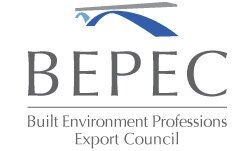In 2017, Alastair Currie of the Institute of Municipal Engineering of Southern Africa (IMIESA) spoke to Chris Campbell, former CEO of Consulting Engineers.
South Africa and the new chairman of the Built Environments Professions Export Council (BEPEC). The interview resulted in an in-depth feature about what BEPEC is all about and why any engineer and engineering company with export ambitions should consider joining.
Reason 1: “BEPEC offers a one-stop-shop for international clients who are in the market to employ South African built environment professionals,” explained Campbell. “BEPEC is a section 21 non-profit organisation in public private partnership with the South African Department of Trade and Industry (DTI). Together with the DTI we provide support to export-ready firms to export their built environment services internationally.”
Reason 2: BEPEC and the DTI are addressing many challenges exporters face, including the limited number of projects they can bid for, administrative challenges, visa requirements, legislative problems, lack of transparent regulations and time wasted on getting to grips with government procurement requirements.
Reason 3: BEPEC is a diverse organisation that is committed to transformation. In February 2017, we announced the inclusion of the contracting services sector, enabling members of the South African Forum of Civil Engineering Contractors (SAFCEC), the Black Business Council for the Built Environment, and Master Builders of South Africa to join.
Reason 4: One of BEPEC’s key advantages is the ability to bid competitively against other international companies in Africa and to establish lasting infrastructure solutions. Campbell: “We can ensure a high standard of work which includes the construction materials used. This includes ensuring that the standards adopted are sustainable for a specific country. In South Africa, for example, some of the materials used during the construction of the 2010 FIFA World Cup stadiums were over specified and unnecessarily increased the overall costs.”
To read the entire interview, click here.
